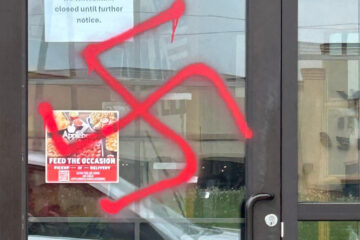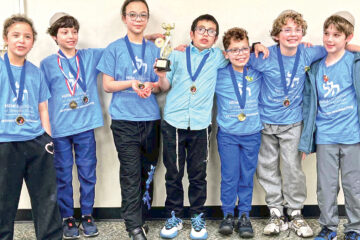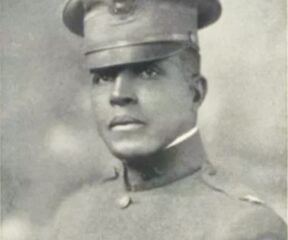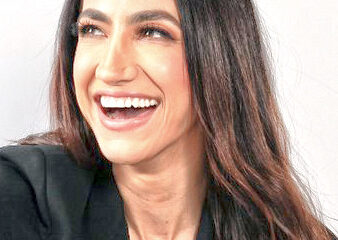A song for the day of worship
Non-Jews help bring music to temples on High Holy Days and Shabbat

Non-Jews hired to perform liturgical music for liberal Jewish congregations is not unusual. But the stories of those who come to do it and why they continue are unique.
By Renate Frydman, Special To The Dayton Jewish Observer
Diann Bromberg has served as piano accompanist for Temple Beth Or and its choir since the summer of 1996.
She is a self-taught musician who grew up in Columbus. Her family attended church regularly and she received her first piano when she was 5 or 6, given to her by a fellow church member.
“We crammed it into a tiny bedroom and later it went into the basement,” Diann says.
“I learned music on my own from a beginner’s book. Once I learned to play, I found I loved spiritual music.”
Diann, a clinical psychiatric social worker, is in private practice with her husband, Dr. Richard Bromberg.
When she began attending services at Beth Or with Richard, she heard that the position of accompanist was open and auditioned.

After she got the position, Cantor Joyce Dumtschin gave her a binder of the musical pieces.
“With no experience with Hebrew music, I found it hard to follow the choir,” Diann says. “But I learned.”
“I have gotten used to it and I love the music very much. Since I always loved the beauty of spiritual music, this was right up my alley.
“I am at people’s life events, and it is quite an honor and privilege to play at Bar and Bat Mitzvah ceremonies. If I can inspire someone and give someone that ‘moment,’ it makes me happy.”
The choir, Diann says, is at services to encourage people to sing. She hopes that when people come to the temple, they experience a moment with God.
“I hope to inspire and not get in the way,” Diann says.
There are approximately 10 people in the Temple Beth Or choir, more for the holidays. Diann and the cantor have been the only paid members; the rest are volunteers. Diann plays every first and third Friday night and for special occasions.
“It comes from the heart, the measure of the choir sounds,” she says. “The passion is the same, the inspiration is the same. It is a way to contribute to the temple. I feel right at home at this house of worship. I am a member now and don’t go anywhere else for worship.”
Alan Halpern, administrator and sh’liach tzibbur (cantorial soloist) for Temple Israel, is something of a liturgical coach for his temple’s High Holy Days quartet. Soprano Courtney Snow Cummings is Jewish; tenor Jason Amos, mezzo Jane Collinsworth, and bass Ray Landis are not Jewish.
Because all are trained musicians, they “do a lot with very few rehearsals,” Alan says. “There are a variety of reasons to involve music in the services. It brings people together, it involves the congregants.”
Alan is the quartet’s arbiter when it comes to Hebrew pronunciation, selection of music, vocal parts and cues.
One of the mainstays at Temple Israel is piano and organ accompanist Dr. J. Ritter Werner. He has accompanied the choir for the High Holy Days and most Friday evening Shabbat services for almost 15 years. Ritter brings a wealth of knowledge and a solid musical background to the choir.
“My father and grandfather both were violinists with the Cincinnati Symphony Orchestra,” Ritter says. “They lived in Avondale, where lots of Eastern Europeans lived. My grandfather, who also played the cello, taught Jewish children music on Sunday and Christian children on Saturday.”
Though Ritter’s family, from southern Germany, was not Jewish, he recalls that one of his great-grandmothers was Jewish.
Ritter’s first taste of Jewish music was in college when his organ teacher played at Rockdale Temple in Cincinnati. Sometimes he substituted for his teacher.

“They had a wonderful choir that had a real feeling for that music,” Ritter says. “The whole choir and conductor happened to be non-Jewish. I heard this wonderful playing.”
In the 1980s, Ritter studied Greek, then Hebrew at Dayton’s United Theological Seminary, where he received his second degree, in biblical languages. And he remembered his experience at Rockdale Temple.
“I roamed through the library of HUC (Hebrew Union College), which was right down the street from University of Cincinnati,” he says. “I spent 10 years at UC studying history and music.”
In 1991, Ritter went to Beth Abraham Synagogue to hear the music and choir on the High Holy Days.
“When I was at Beth Abraham I was moved to tears,” he remembers. “Sometimes, I helped Cantor Kopmar with the choir.”
His relationship with Temple Israel began with Rabbi P. Irving Bloom. It continued when he became accompanist for Ilana Wolpert, who became cantor at Temple Israel.
“I started working with Ilana, first for the High Holidays. She wanted me to help her perfect her nusach, the liturgical mode.”
During the winter season, Ritter plays keyboard three or four Friday nights a month, and is sometimes accompanied by Rabbi David Sofian on the guitar. He also plays for Bar and Bat Mitzvah ceremonies and during the High Holy Days.
He praises Alan as “very sensitive to the musician. Alan is always looking for new music. Sometimes the new has roots in the old, just with new melodies,” he says.
“We try to appeal to all ages in the congregation,” Ritter adds. “Temple honors all people over 80 years with music from when they were younger. Music makes an incredible impression on people. Music encapsulates the essence of what the text is about.”
Ritter says he lost contact with Jewish culture when his father died right before he was 16.
“Now at temple, I feel like I am home.”
Jane Collinsworth lives in Westerville, northeast of Columbus, and travels 80 miles each way to sing with Temple Israel’s High Holy Days quartet.

A retired music teacher, she now substitutes at schools when needed. She has sung alto in the quartet since 2003.
Raised in Wichita, Kan., Jane is the youngest of six children who are all musical. Both of her parents were professional musicians: her mother was a voice teacher and her father was a vocal soloist with the symphony. He also sang at Temple Emanuel in Wichita when they needed a strong male singer.
The rabbi there taught him Hebrew and he sang for seven or eight years on the High Holy Days. He sang at other churches at the same time.
Jane met her husband, Dave, in a church choir. They have lived in Ohio for 21 years.
“Hebrew didn’t come that hard,” Jane says. “I understand my faith much better from having done this. Judaism is the basis for Christianity. By learning more Jewish tradition, I understand better why we do the things we do. There is a rich history with Jewish tradition.
“Some things change, but the traditional, ancient melodies shouldn’t change,” she says with conviction.
Some people ask her why she keeps going to sing at Temple Israel each year.
“It is part of my faith,” she says firmly. “They are my extended family. There are certain faces I always look for. It’s worth it. I love it.”
One story that is now part of a congregation’s history is that of Dr. Kenneth Scheffel, an Episcopalian, who for many years sang during the High Holy Days at Temple Sholom in Springfield. He died on April 5, two years after being diagnosed with stage 4 cancer.
May his memory and his music always be for the Springfield community, a blessing.
Music in Jewish worship
In The Jewish Book of Why, author Alfred J. Kolatch explains that instrumental and vocal music were integral parts of the rituals for the First and Second Holy Temples in Jerusalem.
Following the destruction of the two Temples, in 586 BCE and 70 CE, Kolatch writes, “as an expression of mourning, the playing of music was banned at religious services and all public functions. However, this all-embracing ban became difficult to enforce, and music was permitted at weddings.”
Talmud Tractate Beitzah instructs, “one may not smack or dance or clap on Shabbat and Yom Tov.” The tractate also indicates that “one may not smack or clap or dance, lest one fix a musical instrument.”
Dr. Eric L. Friedland, Sanders Professor Emeritus of Judaic Studies, adds, “as is generally known, traditional Judaism discountenances instrumental music during Shabbat and festival services, much less choirs/musicians made up of women and/or gentiles. By contrast, Reform — and often Conservative as well as Reconstructionist — synagogues avail themselves of them so to enhance the aesthetics of Jewish worship.”
— Marshall Weiss
‘A small, dedicated group’
Dr. Robert Agnew provides music for a small, Reform congregation in Piqua.
“Temple Anshe Emeth is very fortunate to have him,” says congregant Eileen Litchfield. “He enhances the services so much.”
Robert, a retired professor of music and humanities at Edison State College and a Jew, has played keyboard and guitar at services for the past five years at the temple.
Most of the services are Friday nights, with some on Saturday mornings and during holidays.
He writes his own music. Robert’s doctorate is in music composition, and occasionally he plays these works at services.
His local musical career includes singing at Temple Israel when Paul Katz directed the choir.
He was also part of a Jewish quartet for 10 years that included Bonnie Rosenzweig, Jay Weiss, and Ilana Wolpert, called Shir ha Yonah, Song of the Dove.
“We sang at the Piqua Temple between 1985 and 1995,” he says. “I also played at Jewish and non-Jewish folk festivals.”
Robert is accompanied at the temple by his 11-year-old son, Guil, on cello and 15-year-old Jack Dargemann on keyboard.
The Agnews moved to Troy in the early 1980s from Youngstown. He says he is “happy just to play at the temple. It is a wonderful congregation, a small, dedicated group.”
— Renate Frydman





